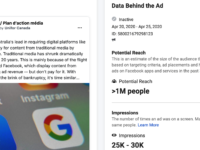Canadian Heritage Minister Pablo Rodriguez is expected to introduce the Online News Act (technically An Act respecting online communications platforms that make news content available to persons in Canada), his response to a massive lobbying campaign from Canadian media organizations today. Bill C-18 will hand new power to the CRTC to oversee what are effectively mandatory payments by Internet platforms such as Google and Facebook for the mere appearance of news on their platforms. This represents nothing less than a government-backed shakedown that runs the risk of undermining press independence, increasing reliance on big tech, and hurting competition and investment in Canadian media. I will have several posts in the coming days including an analysis of the bill once it drops and a review of the lobbying campaign for the bill, which included over 100 registered lobbyist meetings by News Media Canada over the past three years and skewed coverage of the issue in which the overwhelming majority of news stories backed government intervention.
Post Tagged with: "news media canada"
My Appearance Before the Senate Committee on Transport and Communications: Why Copyright Reform Isn’t the Answer to the Challenges Faced by the News Media Sector
Yesterday I took a break from talking about Bill C-10 to appear before the Senate Standing Committee on Transport and Communications as part of its study on Bill S-225, Senator Claude Carignan’s bill that proposes copyright reform as a mechanism to address the challenges faced by the news media sector (the bill is the focus of this week’s Lawbytes podcast, featuring a conversation with Senator Paula Simons). I was joined by representatives from News Media Canada and Facebook, which made for an engaging discussion. My opening statement is posted below:
Beware the Unintended Consequences: Some Warning Signs for Canada from the Australian Government Battle With Facebook
Last year, the Australian government presented Google and Facebook with an ultimatum: if the companies wanted to continue to allow users to link to news articles, they would be required to compensate news organizations. The Australian plan called for the creation of a mandated code that would create a process to determine the price to be paid for the links. Facebook’s response made it clear that if that was the choice – links with mandated payments or no links – it would choose the latter and block Australian news sharing from its service. While some described this as a threat (including Canadian Heritage Minister Steven Guilbeault) or a bluff, it turns out the company was serious.
The Law Bytes Podcast, Episode 70: “It’s Massive Free Distribution” – Village Media’s Jeff Elgie on Why His Company Opposes Lobbying Efforts to Establish a Licence for Linking to News Stories
News Media Canada, the lobby group representing the major newspaper publishers in Canada recently launched a new campaign that calls for the creation of a government digital media regulatory agency that would have the power to establish mandated payments by Internet companies merely for linking to news articles. But not everyone in the sector – or even within News Media Canada – agrees with the position.
Jeff Elgie is the CEO and majority shareholder of Village Media, a digital-only media organization that operates local news and community websites throughout Ontario. He joins the Law Bytes podcast this week to talk about operating local news sites in the current environment, why he welcomes referral traffic from companies like Facebook and Google, and why though he respects News Media Canada, he hopes that a new association will emerge that better represents the diversity of news media in Canada.
What’s Another Way Supporters of Mandated Facebook Media Payments Promote Their Position? Paid Facebook Advertising
Earlier this week, I posted on the lobbying campaign of News Media Canada, the group representing the major Canadian news media publishers, to call for the creation of a government digital media regulatory agency that would have the power to establish mandated payments for linking to news articles on social media sites, establish what content is prioritized on those sites, and potentially issue fines in the hundreds of millions of dollars. The report inaccurately describes the proposed Australian approach upon which it is modelled, avoids acknowledging that payments would be for links, and would open the door to hundreds of millions on tariff retaliation.











